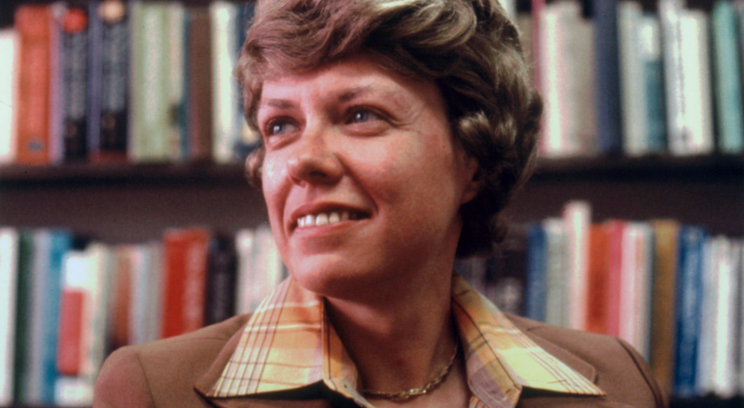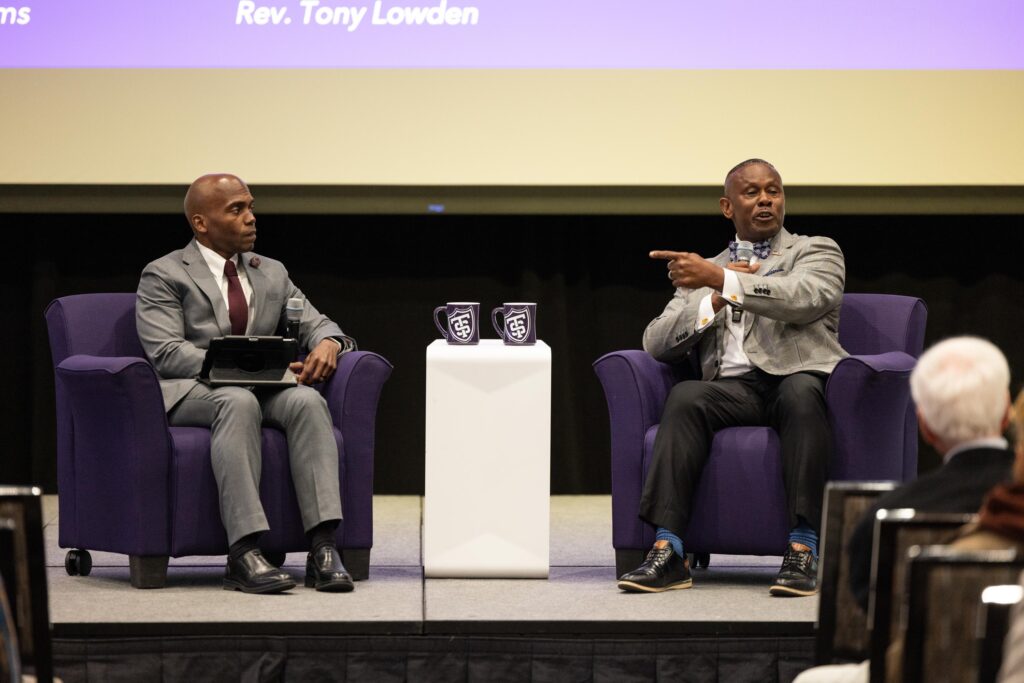This Friday, April 5, St. Thomas will celebrate the 20th anniversary of the Luann Dummer Center for Women. As the years roll on, there are fewer of those at St. Thomas who knew the center’s namesake personally. Through the center, the St. Thomas community knows the late Luann Dummer as a strong feminist and advocate of women in academics, 1989’s Professor of the Year and a tireless faculty member in St. Thomas' English Department, which she chaired from 1976 to 1988. To those who knew her intimately, she was all of the above and more: a gourmet cook, a Chicago Bears fan, a dog and cat lover, and an expert on medieval literature.
One part of her life she kept relatively private, however, was her wealth. After her death on July 7, 1992, a little more than a month after doctors diagnosed her with terminal lung cancer, Dummer bequested $1.2 million, to the surprise of many of her friends and colleagues, to St. Thomas for the establishment of a center for women.
In her will, which she drafted by hand the day of her diagnosis, she made just one stipulation: The center should sponsor one prominent woman speaker as part of an annual series to be held every March – Women's History Month. The rest she left up to her good friend, the late Dr. Pauline Lambert, who was the first woman to hold a senior administrative post at St. Thomas.
The physical space on the first floor of O'Shaughnessy Educational Center keeps a women's studies library stocked with hundreds of books, an art collection and a comfortable lounge for study, events and group meetings. The center also created grant opportunities for women faculty, staff and students at St. Thomas. Since 1996, it has awarded approximately $25,000 annually.
After 20 years, the center has become what Dummer envisioned, a place in the heart of campus that, according to its mission statement, fosters the intellectual, spiritual and personal development of women, and promotes an open and diverse environment at St. Thomas.
Brains and brawn
Michele Hodgson ’84, a former student and teaching assistant of Dummer, recalled that “Luann loved introducing her students to heroic literary feminists who used brain and brawn and bawdiness to their advantage.” She remembers two in particular that were close to Dummer’s heart: the Wife of Bath in The Canterbury Tales and Bertilak’s wife in Sir Gawain and the Green Knight. “Both women lived life on their terms, expecting and demanding the kind of personal freedoms and power typically enjoyed only by men. I think Luann relished the cosmic (and comic) justice of it all,” Hodgson said.
Not unlike her two favorite literary heroes – women whom scholars often see as early examples of feminism in an age when women's roles appeared to be defined in relation to men – Dummer blazed trail for women at St. Thomas.
Friends and colleagues observed that she experienced difficult times as one of the first women in St. Thomas' history to chair a department, a role she undertook a year before the university went co-ed. Often described as politically savvy and passionately dialed into the cultural climate at St. Thomas, Dummer "understood the ins and outs of St. Thomas and where the minefields were, and she knew how to negotiate them," said Dr. Brenda Powell, long-time professor of English at St. Thomas and a close friend and colleague of Dummer. "I think she had the realization that this was the only way St. Thomas would get a women's center."
Dr. Mike Bellamy, professor emeritus of English at St. Thomas and another friend of Dummer, agreed. "She had a strong personality and was very savvy about what was going on at the university. We got used to having a lot of meetings," he recalled of Dummer's tenure as English chair. "When there was an important issue she always recognized it and called us together to tell us what was going on and to ask us what we thought."
As a teacher, she made freshman writing courses a priority and was committed to Writing Across the Curriculum, the goal of which is to fundamentally transform how teaching and learning happen at St. Thomas. Hodgson remembers vividly Dummer’s teaching style: “She was a woman who enjoyed laughing and humor, especially with Chaucer and all of his bawdy characters. She had the ability to incorporate her academic knowledge with her insights as a human being.” She admits to feeling proud that to this day she can recite from memory the General Prologue to the Canterbury Tales in middle English because of Dummer. “When you’re having fun when you’re learning, it sticks,” she said.
Hodgson, who enrolled at St. Thomas after working several years as a medical secretary, also saw a side that Dummer often kept to herself: “She could be very confident and strong, but then again she was a shy person, and there were times, as her teaching assistant, I could tell she was uncomfortable. She had that human side to her, though, and I think her laughter allowed her to be more comfortable in her teaching and her relationships.”
A sudden end to a colorful life and career
After nearly 50 years of a life lived with passion and laughter, and having built a career decorated with ground-breaking success, Dummer found herself drawn to women’s studies, a path she pursued ardently.
In April 1990, Dummer presented a paper, "'In Me There Is No Trust to Trust In': Anti-feminism in Marion Zimmer Bradley's The Mists of Avalon." To Powell this marked "the beginning of her becoming more of a feminist and not just a strong woman. There was a way that as a scholar, she turned to feminism at that point." Around that time Dummer had initiated the development of the Women's Studies program at St. Thomas and served as its first director.
By June 1992, Dummer was excited to spend the next two years running the St. Thomas part of a four-year ACTC program offering a women's studies major when she received devastating news from her doctors. She had recently taken to wearing tennis shoes with heel inserts to alleviate the excruciating backaches that had been plaguing her for months. Her X-rays revealed the worst-case scenario: A prolific smoker of menthol cigarettes, she had a tumor in each lung. The cancer had spread to her spine, causing her back pain.
Doctor's recommended she be hospitalized that day, so worried were they that she would not be able to endure the pain. But she would have none of it. She returned home, broke the news to a few close friends and drafted her will in the same generous and take-charge spirit with which she lived. In addition to the women's center, Dummer set up trust funds for the children of a colleague and four of her cousins; she gifted $10,000 to Lambert and her husband, Dr. Merritt Nequette, then a professor of music at St. Thomas, for travel to Europe; and she earmarked $2,500 to treat some of her colleagues to dinner at Ristorante Luci, her favorite restaurant near her home on Standford Avenue. An anonymous donor was so touched by this that he or she offered the use of an antique Rolls Royce and driver to take Dummer's parents to the dinner.
Also, unbeknownst to her English colleagues, Dummer had been donating $9,000 anonymously to the department every year so it could hire part-time adjunct faculty, allowing three full-timers to take a semester off from teaching to develop courses or study; she gave $250,000 to the English Department so it could continue the practice, but with the stipulation that the department, and not the administration, could wield authority in the matter.
Dummer was 50 when she died.
When St. Thomas honors Dummer and her legacy this Friday, it will unveil a sculpture in her likeness. Her favorite motto, which she revised from the last line of the clerk's tale from the General Prologue of Canterbury Tales, will read across the bottom: "I will gladly learn, and I will gladly teach."
Read on to learn more about the vibrant woman behind the Luann Dummer Center for Women:
- Born Oct. 1, 1941, Dummer was adopted as an infant by Lowell and Lavona Dummer and raised in Palatine, Ill., a Chicago suburb. She was an only child.
- Her father, a World War II veteran, learned how to use a printing press during the war and afterward founded a printing business with his brother Bruce. McDonald’s was among their prominent clients, and the business grew to enjoy enormous success.
- She had a penchant for mystery novels, which is why some of the past Women's History Month speakers and center-sponsored book clubs texts have been mysteries.
- She was a fierce competitor in racquetball and ping pong, according to her game partner, Bellamy.
- Complicated crossword puzzles were no match for her, including the notorious Friday New York Times crossword. Some of her colleagues suspect this talent helped her excel at one inglorious and thorny task that comes with chairing a department: scheduling courses.
- At the time of her death she had a mini schnauzer she named Morgan, after the powerful sorceress Morgan le Fay of the Arthurian legend, and a cat she named Alise (pronounced Alice), inspired by Alisoun, a.k.a. the Wife of Bath.
- In 1983 she became the second woman at St. Thomas to be promoted to full professor, an honor of which she was enormously proud.
- Her last car, a Nissan 300ZX, was a true racing car that she nicknamed the Starship Enterprise because of its hulking size. It was the same model actor Paul Newman drove when he raced professionally.
- "She was famous for sending her Christmas cards around St. Patrick’s Day. If she got them out by then, she was doing pretty well. She also had this interesting cramped handwriting that was at a slant. It was impossible to read, like deciphering hieroglyphics," said Hodgson.
- In addition to medieval literature, Dummer taught linguistics. Dr. Meg Wilkes Karraker, sociology professor at St. Thomas, remembers, "In my second or third year at UST, I ran across a new word in one of my areas of specialization, sociology of adolescence: 'transessence.' No idea what it meant. Someone suggested I contact Dr. Dummer, who – correctly – suggested it meant the transition from childhood into adolescence. Who else would have known?"
- She threw lavish dinner parties, for which she spent days preparing, even experimenting on new dishes in practice runs before she would serve them to friends. Among the dishes she served were individual Cornish game hens and "chocolate fettucine" – a dessert made by slicing homemade crepes into long strips and drizzling them with hot fudge sauce and whipped cream.
- She was very close to her parents and all three regularly convened in what they called "long-distance happy hour." All three would pour a drink at 5 p.m. and chat about the day's events. As the end of her life drew near, Dummer made a request to her doctors. She wanted to toast her parents with a proper nightcap on the night of their 57th wedding anniversary, July 6. Powell remembered her friend giving her detailed instructions on where to find the highball glasses at her house and how to make a lemon twist. Although her health was deteriorating rapidly, Powell recalled how Dummer was adamant that she would not die on the their anniversary. That night, Powell accompanied Dummer's parents to The Lexington to celebrate their anniversary. At 3 a.m. she got the call to come back to the hospital. Luann was dying, but she fought to live a few hours into the next day.
Not all of Dummer’s friends and colleagues who contributed their memories and insights to this article were cited. The Newsroom would like to thank the following friends and colleagues of Luann Dummer for their help: Dr. Susan Alexander (executive adviser to the president, Economics Department), Dr. Young-ok An (English Department; director, Luann Dummer Center for Women), Dr. Michael Bellamy (Professor Emeritus, English), Michele Hodgson (freelance writer and former student of Dummer), Dr. Merritt Nequette (Professor Emeritus, Music; former associate academic dean), Dr. Brenda Powell (English Department), Dr. Joan Piorkowski (English Department) Dr. Meg Wilkes Karraker (Sociology Department), Dr. Gale Yee (professor at Episcopal Divinity School and former Theology professor at St. Thomas), Dr. Nancy Zingale (Professor Emeritus, Political Science; former executive adviser to the president).







